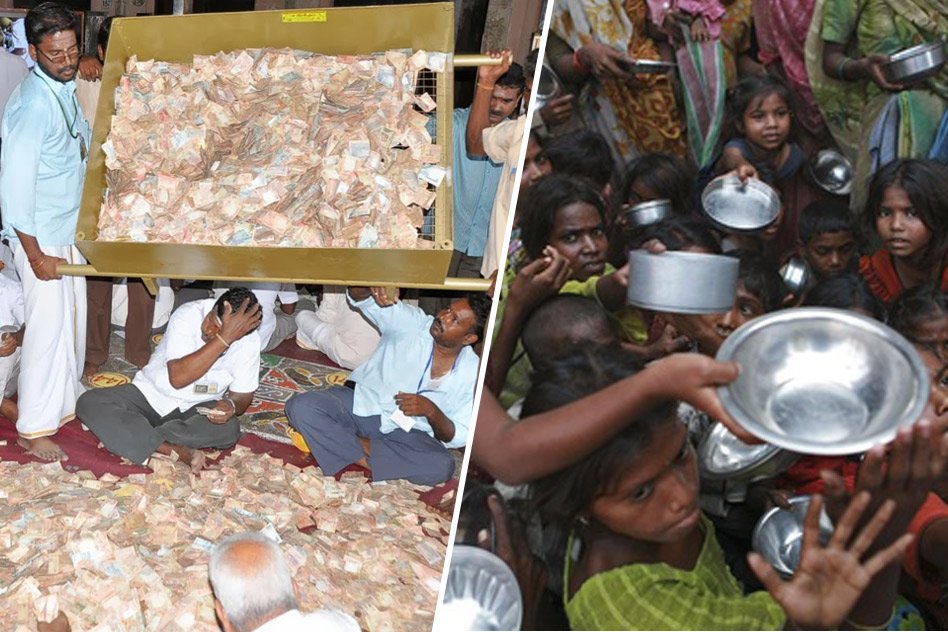Information Source: Dainik Bhaskar | Image Source: Quora , Causeitworks
Do you know what India’s rank is in the World Giving Index (WGI)? WGI is an annual report published by the Charities Aid Foundation, using data gathered by Gallup, and ranks over 30 countries in the world according to how charitable they are. India’s rank in 2014 was 69, lower than our neighbours, Sri Lanka (9) and even Bhutan (11).
Let us first know about India’s external debt position. It was 6.6% of the GDP during the financial year ending March 2015, a sum of $ 475.8 billion, according to the Reserve Bank of India release.
How are these two things related? Well, both are related to economic growth and economic development. How many of us have linked the two to a third source of treasure in our country, the temples? The wealth in our temples has the potential to solve these two problems.
How is this possible? Since 2012, we have been witnessing how the centuries-old Padmanabha temple in Thiruvananthapuram in Kerala was on its way to become the richest shrine in India. A staggering $ 22 billion was recovered from the secret cellars of the temple since the Supreme Court ordered its examination. Much of it was donated by the local royal family and the vaults were not opened for almost 150 years. The donations of this kind and to any temple is not only resources of the rich but also of poor.
Recently, Tirumala Tirupati Devasthanams, the managing body of Tirumala Venkateswara Temple, opened up a demat account to accept donations in the form of shares and securities. The temple, as of August 2014, had around 5,000 kg of gold deposited with various banks in India.
Last month, Dainik Bhaskar conducted an investigation of 4 big temples of India – Tirupati Tirumala, Siddhivinayak, Siridih Saibaba, Kashi VIshwanath Mandir. They wanted to find out how the donations in these temples were being utilized.
The combined value of donations received by these temples was around 1 lakh, 32 000 crore!! This is more than the wealth of the richest man in India. Around 5 lakh devotees donate Rs 8 crore daily in these temples. While 2 % of this donation is spent on gods and 40% are spent on the salaries of the Pandits, Mahants and others employed by the temples. Some of it is used in charity work by the temples surely. An example is the kidney dialysis centres established by Sddhivinayak temple to treat patients for Rs 250, or the Mahavir Cancer and Research Institute, established by Mahavir Mandir, Patna. But what happens to the rest of the money, or the money to many other temles?
According to an estimate from the World Gold Council, the gold held in wealthy Hindu temples in India is about 22, 000 tons, worth $ 1 trillion.
Now the big question is – who should control all this wealth? Can this wealth be better utilized? Would it not make sense to divert this huge resource towards solving some of problems related to Indian economic growth and development? The government is trying to coax these temples to deposit the gold in the banks so that the gold does not sit idle and is used in economic development and welfare. It can surely be used to correct some of the problems of balance of trade. The government has only 550 tons of gold, as reported by Arun Jaitley, our Finance Minister, in February, 2015.
We know that this is a touchy religious issue, pertaining to one’s devotion. If God grants us some wish, then the devotees would like to show their gratitude by donating to Him/ Her. However, is it not true that God is omnipotent and omnipresent and everything that is in this world belongs to Him/ Her? Is it not a good idea to spend some of this donation on feeding the poor instead,too?
The issue started trending on social media after Dainik Bhaskar, Zee News, India TV, etc., brought it to the notice of the public. Around 70% of the people who participated in the debates agreed that it would make more sense to do so. Even our religious Gurus, like Baba Ramdev, Sri Sri Ravishankar, and Swami Agnivesh appealed to the people not to donate in temples but use the hard-earned money to do more charity work. The money should reach those who are really in need of it. After all, if the temple gold goes towards nation-building and strengthening the economy, that is good karma, too.
Also the request is not just to people who are making donations to temple but also to those who are making donations to Mosque, Churches or any religious place. Think twice before donating and also where donations are being utilised. Our government has also failed in this aspect, providing Huj subsidy. If anyone is interested to go for religious pilgrimage, why should the tax payers bear the burden? Keeping the religion and state exchequer separate would be the best idea to go with.











